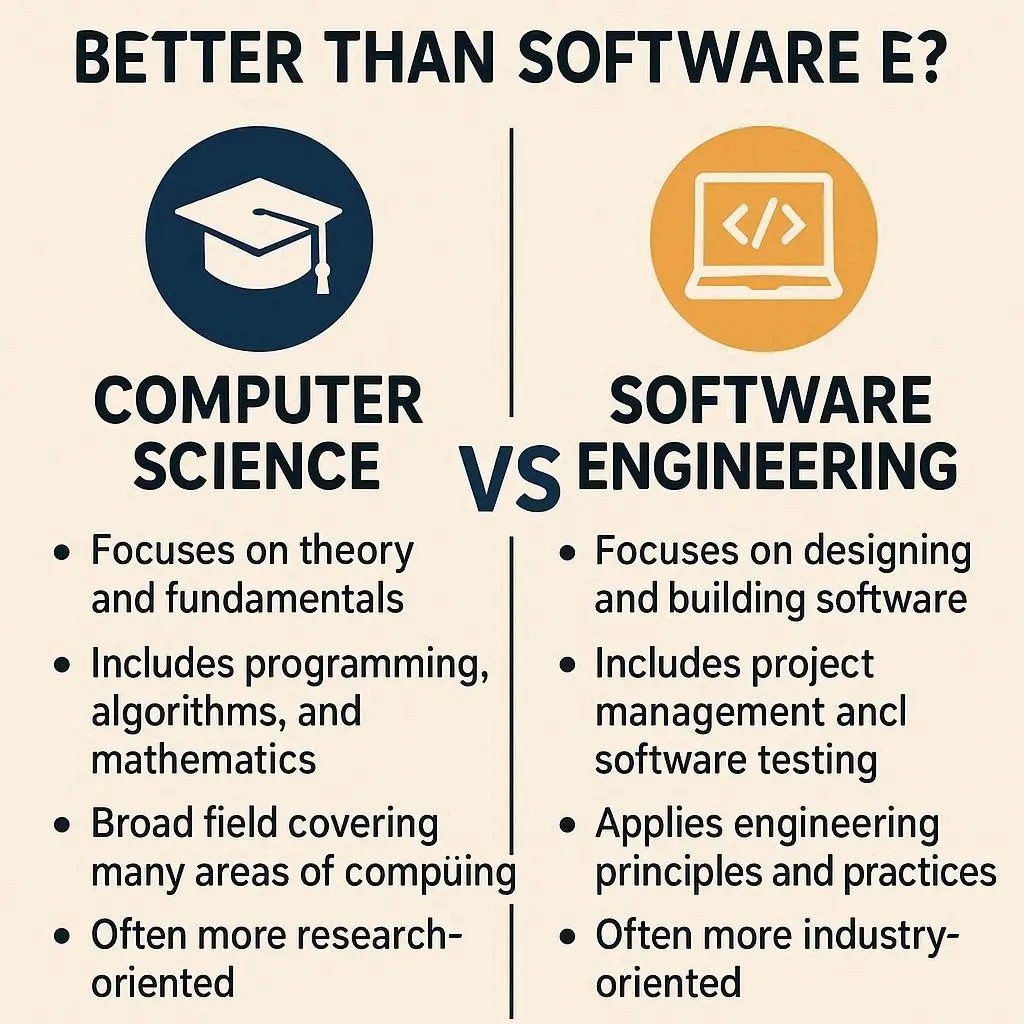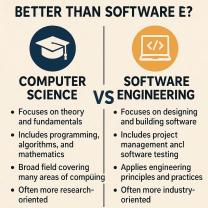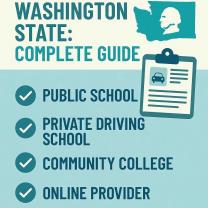Is Computer Sciences better than software engineering?
The world of technology is vast and ever-evolving, driven by brilliant minds working in various specialized fields. Among the most fundamental yet often debated areas are Computer Science (CS) and Software Engineering (SE). These two disciplines, while deeply intertwined and often overlapping, represent distinct approaches to the digital realm. Aspiring tech professionals frequently find themselves at a crossroads, pondering which path to pursue, with questions like "Is computer science better than software engineering?" echoing in their minds.
Both Computer Science and Software Engineering play absolutely vital roles in driving innovation, from developing groundbreaking artificial intelligence to crafting the intuitive applications we use daily. Yet, their core focus areas diverge significantly. Computer Science tends to delve into the theoretical underpinnings of computation, seeking to understand why and how algorithms work. Software Engineering, on the other hand, concentrates on applying these theoretical principles to systematically design, build, and maintain robust, scalable, and reliable software systems.
This article aims to provide a detailed, objective comparison of these two powerhouse fields. We will explore the nuanced difference between computer science and software engineering in terms of their academic focus, typical coursework, and real-world applications. We'll examine their respective career paths, salary expectations, and ultimately guide you on how to choose the best fit based on your personal goals, interests, and inherent strengths.
What Are the Differences Between Computer Science and Software Engineering?
To understand the core distinctions, it's essential to define each field clearly and then compare their academic and practical approaches.
Computer Science (CS)
Focus: Computer Science is primarily concerned with the theoretical foundations of information and computation, and their practical implementation and application. It's an academic discipline that explores the fundamental principles behind computing.
Core Areas:
Theory of Computation: Algorithms, data structures, complexity theory.
Artificial Intelligence (AI) & Machine Learning (ML): Developing intelligent systems and algorithms that can learn from data.
Computational Logic: Formal methods, programming language theory.
Data Science: Analyzing and extracting insights from large datasets.
Operating Systems & Networks: Understanding how computers and networks function at a fundamental level.
Academic Focus: More research-oriented, abstract, and mathematical. CS programs delve into advanced mathematics, theoretical proofs, and the fundamental limits of computation.
Typical Coursework Examples: Algorithms and Data Structures, Discrete Mathematics, Automata Theory, Compilers, Machine Learning, Operating Systems, Computer Architecture, Cryptography.
Real-world Applications: CS often leads to innovation in new technologies. Think of the research behind new AI breakthroughs, advanced cybersecurity protocols, or the development of entirely new programming paradigms. It's about discovering and understanding the 'how' and 'why' of computation.
Software Engineering (SE)
Focus: Software Engineering is an engineering discipline that applies systematic, disciplined, and quantifiable approaches to the design, development, operation, and maintenance of software. It's about building reliable and efficient software products.
Core Areas:
Software Development Life Cycle (SDLC): Planning, analysis, design, implementation, testing, deployment, and maintenance.
Project Management: Managing teams, resources, and timelines for software projects.
Software Design Patterns & Architecture: Creating robust, scalable, and maintainable software systems.
Quality Assurance & Testing: Ensuring software is bug-free and meets user requirements.
User Experience (UX) & User Interface (UI): Designing intuitive and user-friendly software.
Academic Focus: More project-driven, collaborative, and focused on industry best practices. SE programs emphasize engineering principles for creating high-quality software, often involving group projects and real-world simulations.
Typical Coursework Examples: Software Design and Architecture, Software Testing and Quality Assurance, Requirements Engineering, Project Management, User Interface Design, Database Systems, Web Development Frameworks.
Real-world Applications: SE focuses on building practical products and solutions that people use every day. This includes developing mobile apps, web applications, enterprise software, and embedded systems. It's about constructing and maintaining functional software.
The key difference between computer science and software engineering can be summarized as discovery vs. construction. CS explores the underlying principles, while SE applies those principles to create tangible, reliable software.
Which Field Offers Better Career Opportunities?
Both Computer Science and Software Engineering are incredibly high-demand fields, consistently listed among the top jobs globally. However, the types of career opportunities and roles they lead to often differ based on their academic focus. Neither field unequivocally offers "better" opportunities; rather, they offer different and equally rewarding paths.
Career Paths for Computer Science Graduates:
CS graduates, with their strong theoretical and algorithmic backgrounds, are often found in roles that involve deep technical challenges, research, and data interpretation.
Research & Development (R&D) Engineer: Developing new algorithms, computational models, or technologies.
Data Scientist: Analyzing complex datasets to extract insights, build predictive models, and inform business decisions.
Machine Learning Engineer: Designing, building, and deploying AI models.
AI Engineer/Researcher: Specializing in advanced AI algorithms, neural networks, and intelligent systems.
Cybersecurity Analyst/Engineer: Protecting systems and data from threats, often involving deep understanding of network protocols and cryptography.
Algorithm Developer: Creating efficient algorithms for various computational problems.
Academia: Pursuing Ph.D.s and becoming professors or researchers.
Career Paths for Software Engineering Graduates:
SE graduates are typically found in roles focused on the entire lifecycle of software product development, emphasizing collaboration and practical implementation.
Software Developer/Engineer (Backend, Frontend, Full-Stack): The most common role, building and maintaining web, mobile, or desktop applications.
Systems Architect: Designing the overall structure and components of software systems.
DevOps Engineer: Bridging development and operations to streamline software delivery and infrastructure management.
Quality Assurance (QA) Engineer: Ensuring software products meet quality standards through testing.
Product Manager (with technical background): Overseeing the development of software products, translating user needs into technical requirements.
Embedded Systems Engineer: Developing software for hardware devices (e.g., IoT, automotive).
Industry Trends and Job Market Stability:
Both fields benefit from massive global growth in technology.
Rise in AI/ML Roles: The demand for AI engineers and data scientists (often CS-heavy roles) is skyrocketing, driven by advancements in artificial intelligence.
Full-Stack Development: The need for developers who can handle both front-end (user interface) and back-end (server, database) development remains high, often falling under the SE umbrella.
DevOps Demand: Companies are increasingly seeking DevOps engineers to improve efficiency and reliability in software deployment, a role well-suited for SE graduates.
Both fields offer excellent job market stability. While specific technologies and tools evolve rapidly, the underlying demand for people who can either understand the theory of computation (CS) or build robust software solutions (SE) is constant and growing. The choice between a computer science or software engineering career ultimately depends on whether your passion lies in theoretical discovery or practical construction.
How Do Salaries Compare Between CS and Software Engineering?
When considering computer science vs software engineering salary, it's important to note that both fields command excellent compensation, far above the national average in most countries. The specific salary often depends more on factors like role, experience level, industry, company size, geographic location, and individual skill specialization rather than the degree title itself. However, general trends can be observed.
Average Salary Comparisons (Illustrative, based on US data - e.g., Glassdoor, BLS):
Entry-Level (0-2 years experience):
Software Engineer: ~$70,000 - $100,000
Computer Scientist (e.g., Junior Data Scientist, AI Assistant): ~$75,000 - $110,000
Observation: Entry-level salaries are often quite comparable, with CS roles sometimes starting slightly higher due to specialized skills in demand (e.g., AI, ML).
Mid-Career (5-10 years experience):
Senior Software Engineer: ~$120,000 - $180,000+
Senior Data Scientist/Machine Learning Engineer: ~$130,000 - $200,000+
Observation: CS-heavy roles, particularly in advanced AI/ML or specialized research, tend to pull ahead slightly as experience grows, reflecting the high demand for deep technical expertise.
Experienced/Lead Roles (10+ years experience):
Principal/Staff Software Engineer, Software Architect: ~$180,000 - $250,000+
Lead AI/ML Engineer, Research Scientist: ~$200,000 - $300,000+ (can be significantly higher in top tech companies)
Observation: At the highest levels, both fields offer exceptional compensation. Roles requiring cutting-edge research or highly specialized algorithmic development (often CS-oriented) can reach the very top of the pay scale.
Factors Affecting Salary:
Role Specialization: An AI engineer or Data Scientist (more CS-path) often earns slightly more than an application developer (more SE-path) due to the highly specialized nature of the skills and the current market demand. However, a highly skilled Full-Stack Developer or DevOps Engineer (SE) can easily out-earn a general CS graduate.
Industry & Company Size: Working for a top-tier tech giant (e.g., Google, Meta, Amazon) or a fast-growing startup typically offers higher compensation than smaller or less technology-focused companies.
Geographic Location: Salaries in major tech hubs (Silicon Valley, New York, Seattle, London) are significantly higher to account for the cost of living and intense competition.
Skills & Experience: Proficiency in in-demand programming languages (Python, Java, C++), cloud platforms (AWS, Azure, GCP), specific frameworks, and a strong project portfolio will always boost earning potential regardless of degree.
Graduate Degrees: For CS roles, a Master's or Ph.D. can significantly increase earning potential, especially for research-oriented positions.
Conclusion on Salaries: Both computer science vs software engineering salary comparisons indicate that a career in either field is financially rewarding. While CS-heavy roles like AI/ML engineers or data scientists may have a slight edge at higher experience levels due to specialization, an individual's skills, expertise, and contribution to a company often matter more than the specific degree title. Passion and continuous learning are the best long-term investments for maximizing earning potential in either field.
Which Degree Should You Choose Based on Your Interests?
Deciding which degree is better CS or software engineering truly boils down to a deep understanding of your personal interests, innate strengths, and long-term career aspirations. Both fields are intellectually stimulating and financially rewarding, but they appeal to different mindsets.
Here’s a self-assessment guide to help you choose:
Choose Computer Science If You:
Love Mathematics and Abstract Thinking: You enjoy grappling with complex equations, theoretical proofs, and the underlying logic of systems. You're fascinated by algorithms and data structures as mathematical constructs.
Are Curious About the 'Why' and 'How' of Computation: You want to understand how computers actually work,why certain algorithms are more efficient, or how intelligence can be simulated.
Enjoy Solving Puzzles and Research: You thrive on tackling unsolved problems, pushing the boundaries of what's possible, and contributing to theoretical knowledge.
Are Drawn to Fields like AI, Machine Learning, Data Science, or Cybersecurity Research: You are excited by the idea of creating new intelligent systems, uncovering insights from massive datasets, or building unbreakable cryptographic methods.
Prefer Individual or Small-Team Deep Technical Work: While collaboration exists, CS often involves intense, focused problem-solving that can be quite individual.
Are Intrigued by the Future of Computing: You want to be at the forefront of inventing new computational methods and paradigms.
Choose Software Engineering If You:
Prefer Building Tangible Products: You get satisfaction from seeing your code come to life in a functional application or system that users interact with.
Enjoy Teamwork and Collaboration: You thrive in environments where you work closely with designers, product managers, and other engineers to bring a project to completion.
Are Organized and Detail-Oriented with Project Management: You appreciate the systematic approach of the software development lifecycle, ensuring quality, reliability, and maintainability.
Are Drawn to Developing Apps, Websites, or Enterprise Solutions: You are excited by the prospect of creating user-friendly interfaces, robust backend systems, or complex business software.
Focus on Practical Solutions over Theoretical Exploration: You're more interested in applying existing computational theories to solve real-world problems efficiently.
Enjoy the Entire Product Development Cycle: From gathering requirements and designing architecture to coding, testing, and deployment.
Exploring Before Deciding:
Introductory Courses: Take introductory courses in both programming (often shared by both fields), discrete mathematics (more CS), and software development methodologies (more SE).
Online Resources: Utilize platforms like Coursera, edX, or freeCodeCamp to get a taste of different topics in CS (e.g., algorithms, AI) and SE (e.g., web development, software testing).
Personal Projects: Start a small coding project. Do you enjoy optimizing the algorithm (CS) or making sure the user interface is perfect and the code is maintainable (SE)?
Both fields inherently teach programming, but they instill a different mindset: CS emphasizes discovery and fundamental understanding, while SE focuses on construction, reliability, and user-centric solutions. Your choice should align with which mindset resonates most deeply with you.
Can You Switch Between Computer Science and Software Engineering Careers?
One of the most reassuring aspects of the tech industry is the fluidity between related fields, especially between Computer Science and Software Engineering.Switching between Computer Science and Software Engineering careers is not only common but also highly feasible, thanks to the significant overlap in foundational skills and the industry's emphasis on continuous learning.
Shared Foundational Skills:
Both CS and SE degrees equip graduates with core competencies that are transferable across roles:
Programming Languages: Proficiency in languages like Python, Java, C++, JavaScript.
Data Structures & Algorithms: A fundamental understanding of how to organize and manipulate data efficiently.
Problem-Solving: The ability to break down complex problems and devise logical solutions.
Logic & Computational Thinking: The underlying framework for approaching any technical challenge.
How a CS Graduate Can Become a Software Engineer:
A Computer Science graduate already possesses a strong theoretical foundation, which is highly valued in software engineering.
Focus on Practical Application: Transitioning usually involves gaining more experience in applying theoretical knowledge to building robust, maintainable software.
Learn Software Engineering Best Practices: This includes understanding design patterns, software architecture, testing methodologies (unit, integration, end-to-end), version control (Git), and agile development processes.
Build a Portfolio: Create personal projects (web apps, mobile apps) that showcase your ability to design and build complete software solutions.
Online Courses/Certifications: Pursue specific certifications or online courses in areas like full-stack web development, DevOps, or cloud engineering.
How an SE Graduate Can Pursue Data or AI Roles:
A Software Engineering graduate has strong building skills and can apply them to more CS-heavy roles with focused learning.
Strengthen Math & Statistics: Review or take courses in linear algebra, calculus, and probability/statistics, which are crucial for AI/ML.
Deepen Algorithmic Understanding: Focus on advanced algorithms specifically used in machine learning (e.g., neural networks, optimization algorithms).
Learn Specific Tools & Libraries: Master Python libraries like TensorFlow, PyTorch, scikit-learn for machine learning, and pandas for data analysis.
Gain Research Experience: Pursue personal projects involving data analysis, model building, or even contribute to open-source AI projects. Consider a Master's degree in CS or Data Science for more formal training.
Stressing Adaptability and Continuous Learning:
The tech industry evolves at a breakneck pace. Therefore, regardless of your initial degree, adaptability and a commitment to continuous learning are the most critical factors for long-term career success and flexibility.
Stay Updated: Regularly read tech blogs, research papers, and participate in online courses.
Personal Projects: Always have side projects that challenge you and allow you to learn new technologies.
Networking: Connect with professionals in both CS and SE to understand evolving roles and skill demands.
The foundational knowledge from both degrees provides an excellent launching pad. With targeted learning and practical experience, the boundaries between a computer science or software engineering career become permeable, allowing professionals to navigate and excel in various roles throughout their careers.
Comparison Table: Computer Science vs. Software Engineering
| Feature | Computer Science (CS) | Software Engineering (SE) |
| Primary Focus | Theory, algorithms, computation, underlying principles | Design, build, test, and maintain software systems |
| Mindset | Discovery, understanding, innovation | Construction, reliability, practical application |
| Academic Approach | More theoretical, mathematical, research-oriented | More project-driven, collaborative, industry best practices |
| Typical Skills | Algorithms, data structures, AI/ML theory, math, logic | Software design, testing, project management, coding best practices |
| Example Jobs | Data Scientist, AI Engineer, Research Scientist, Algorithm Developer | Software Developer, Systems Architect, DevOps Engineer, QA Engineer |
| Typical Coursework | Discrete Math, Algorithms, AI, Theory of Computation, Compilers | Software Design, Testing, Requirements Eng., Project Mgmt, UI/UX |
| Average Salary (Mid-Career) | Slightly higher for specialized roles ($130K-$200K+) | Excellent ($120K-$180K+) |
| Math Intensity | Very High | High (but more application-focused) |
FAQ Section:
Is Computer Science harder than Software Engineering?
The "harder" field is subjective and depends on individual strengths. Computer Science is often perceived as more theoretically rigorous and math-intensive, dealing with abstract concepts and proofs. Software Engineering is demanding in its own right, requiring strong problem-solving skills, attention to detail, and the ability to manage complex projects and collaborate effectively. If you struggle with high-level math and theory, CS might feel harder; if you prefer theoretical work over meticulous practical application and team management, SE might be more challenging.
Do both require strong math skills?
Yes, both require strong math skills, but with different emphasis.
Computer Science requires a deep understanding of discrete mathematics, calculus, linear algebra, and probability/statistics, especially for fields like AI, machine learning, and algorithm analysis.
Software Engineering also relies on mathematical logic for programming, and statistics for data analysis and performance metrics. While perhaps not as theoretically intense as CS, a solid grasp of foundational math is essential for problem-solving and understanding algorithms used in building software.
Which has better job security?
Both fields offer excellent job security due to the continuous and growing demand for tech professionals globally. As technology integrates further into every aspect of life, the need for both fundamental research (CS) and robust software solutions (SE) will remain high. Job security often comes down to an individual's adaptability, continuous learning, and ability to stay current with evolving technologies, rather than the specific degree title.
Can you study both together?
Yes, it is possible and often beneficial. Many universities offer programs that combine aspects of both, such as a "Computer Science with a concentration in Software Engineering" or vice versa. Some students pursue a double major or a major in one field with a minor in the other. This combined approach can provide a very strong and versatile skill set, making graduates highly adaptable to various roles in the tech industry.
Conclusion:
The debate over is computer science better than software engineering ultimately leads to a nuanced answer: neither is inherently "better." Instead, the optimal choice hinges entirely on your personal goals, innate strengths, and envisioned career trajectory. Computer Science appeals to those fascinated by the theoretical underpinnings of computation, algorithms, and the frontiers of AI and data. Software Engineering, conversely, attracts individuals who thrive on applying these principles to systematically design, build, and maintain practical, reliable software products in collaborative environments.
Both disciplines promise rewarding careers with high demand and excellent compensation, albeit in roles that cater to distinct mindsets—discovery versus construction. The tech industry values continuous learning and adaptability, meaning that foundational skills from either field provide a robust launching pad, and transitioning between CS and SE careers is highly feasible with dedicated effort and ongoing education.
Therefore, we encourage aspiring tech professionals to explore both fields through hands-on projects, introductory online courses, and informational interviews before committing to a path. Your curiosity and flexibility will be your greatest assets in a world where technology constantly evolves. The most successful professionals are those who align their passion with purpose, driving innovation whether through theoretical breakthroughs or the creation of impactful software solutions.














FutureCoder
on October 11, 2025It really depends on your goals — CS is ideal for research or AI, while SE is perfect for product development.
AI_Explorer
on October 11, 2025If you love problem-solving and theory, choose CS. If you love teamwork and building software, go for SE!